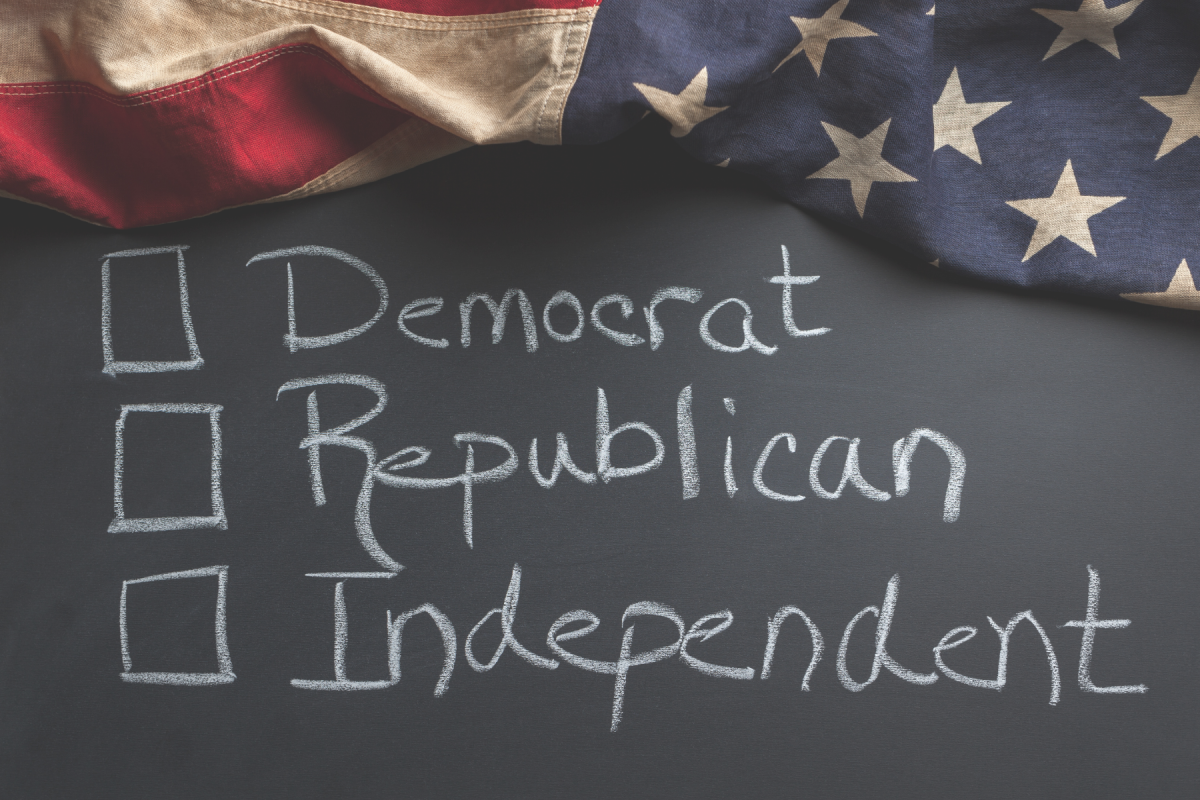I didn’t grow up in a political home. Politics wasn’t something that was discussed much at all really. But somehow I knew that my family (or at least my mom) voted Republican. I didn’t grow up in a Christian or conservative home so it had nothing to do with religion. I actually have no idea what it had to do with. We seemed to be fans of Ronald Reagan and George H.W. Bush. I only really know this because for the 1992 presidential election we voted in school and I voted for Bush. Clinton won at our school and in real life. I don’t think I knew much of anything about politics that day when I voted for Bush (at school). Maybe my memory doesn’t serve me correctly, but I am pretty sure I voted for Bush because of my family’s influence.
A couple years later, when I registered to vote, I didn’t want to be a Republican or a Democrat. I registered as an Independent. I didn’t want to vote for someone because of their political party. I wanted to vote for whom I thought would do the best job and/or who was best for our county. I didn’t feel that either side was exclusively right or exclusively wrong. I couldn’t tell you which side I would have lined up with more at that time, but I knew I wasn’t going to vote for someone based on the letter by their name and I wasn’t going to vote for someone based on one issue.
I don’t remember the 1996 election other than I am certain I didn’t vote for Clinton. I voted for George W. Bush in 2000 and 2004. I voted for Barack Obama in 2008 and 2012.
As the 2012 election was approaching, I didn’t talk about it much at all. It had been 3 years since I returned to church. I was heavily involved and growing in my faith. I was learning more about what it meant to live like Jesus. What seemed strange to me was that it seemed like everywhere I turned, I heard that Christians were Republicans. Christian culture seemed to be saying that Jesus would have been a Republican. I saw and heard this message both implicitly and explicitly.
This didn’t make sense to me for a few reasons. For one, from where I was sitting, the Democrats had several policies that seemed to be rooted in helping and supporting others. These were policies that I felt that Jesus would be in favor of. Secondly, both sides had policies that did support my Christian values and both sides had ones that did not. I just could not understand how people could look at both political parties and determine that Christians HAD to fall in line with Republicans. Plus, I have similarities and differences with other Christians. If I don’t see everything else the same, so why would my political affiliation have to be the same? I don’t even 100% agree with my best friends, my family or my husband. How in the world would I expect that political strangers were going to come up with policies that I would totally be in favor of? I realized that it could not be an all or nothing type of thing for me.
It wasn’t just on a large scale I heard this. When people I knew were in conversation, it led me believe that I would not belong if I spoke of my support of a democratic candidate. To me that subject was off limits, so I just remained silent.
It was very shaming. Even though I was with people that I was close to and called my friends, I said nothing of my political opinions or beliefs because it wasn’t safe. I am not even sure I considered myself a Democrat as my preference was still to be an Independent. What I did know was that I was voting for and supporting Obama. What I also knew was that it was very lonely and felt very judgmental. I was following a Jesus that was about love and acceptance of all. Yet, I didn’t see Christians accepting those that would call themselves Democrats. Nowhere do I see anything that says that I need to be of a certain political party to be a follower of Jesus. I don’t know why modern American Christianity has decided that you have to fall under this political platform to love Jesus. I didn’t have the courage to speak up. I didn’t think that I would be accepted if my true feelings were known. I was the same person whether they knew or if I spoke of my support of Obama, but I didn’t feel that I would be looked at the same. I didn’t want to be talked about behind my back. So I was silent.
Although I didn’t have the courage to speak up, I did have enough strength in my beliefs that I didn’t allow this flawed thought process to determine my convictions. Although not the subject of this post, I thought it important to point out that one of the things that I know that helped me to get to the place I am today is that I did have a Christian friend that allowed me to be me. This was politically and in other areas. Although I felt a lot of shame (but didn’t know it at the time), my friendship with her gave me strength and allowed me to feel accepted in a world that was making me feel that I didn’t belong. I am not sure who I would be today if she didn’t show me that I could be real with her, even when we didn’t see things the same way.
Thankfully, I am stronger now. It is still hard to speak up. I don’t hold any ill will for anyone that contributed to the feeling that I needed to be silent because I know that being silent was my choice. It wasn’t intentional towards me. They didn’t know that I didn’t agree with their blanket statements or see things they way that they did. They didn’t know the words they were saying were hurting me or causing me shame. It goes to show that words matter. Getting to know people matter. You never know what you might say that is hurtful or shame inducing to those around you. I wasn’t strong enough to be vulnerable and share my views so they didn’t have a chance to consider something different. I don’t know what would have happen if I did. I am more secure in who I am now. I hope that people like me for who I am, and not who I vote for or what policy I agree with. I need to be true to myself. If being true to myself drives people away or creates judgment about the type of person I am, than they haven’t earned the right to truly know me anyway.
I tell you this, because I want Christians to know that Jesus doesn’t care about your political affiliation. He cares about your heart. You don’t have to be on a certain side of the aisle to follow Jesus. He loves and accepts you either way. If people or culture are telling you that you can’t support a democratic candidate or party and follow Jesus, they are wrong.
If this surprises you or you are appalled that I would think this way or support Democrats, I just want you to remember, I am the same person I was before you read this. If you know me and you are reading this, I am guessing that you like me, think I am a good person or at least have some qualities that you like. That is all still true.
I am not now nor have I ever been very political. I know how I feel about certain issues. There are some issues that I don’t have a strong feeling about either way. There are probably even some issues, that I can’t say that what I think or believe is necessarily the best political policy, but it makes sense to me as a human. I don’t always speak up or talk politics because I don’t know the ins and outs and I don’t feel competent enough to have a discussion outside of what I think or feel. I don’t have the information to back it up.
What I do care about is the fair treatment and care of all people. Fair treatment and care for all humans encapsulate some of the reasons that Donald Trump will not get my vote. From the beginning, I believe Donald Trump has operated from a hateful and divisive place. Although, not needing to be perfect, our leaders need to be role models. There has been far too much dehumanization, corruption and deceit in the Trump campaign and not nearly enough unity and compassion. I will use my vote to speak out against it. I think lack of humanity may be the greatest threat to our nation. By no means do I think the dehumanization started with Donald Trump nor do I think it will stop once he is out of office. But I need better from our leaders. If we continue to allow that kind of behavior it will continue to spread throughout all of humanity. This is something that I cannot accept.
Originally, I planned to continue this post and talk about polarization and dehumanization. However, I didn’t want to make this post too long. I hope you will continue by reading my next post We Agree About Nothing.


